Nicaragua: Managua,Ometeppe, Leon
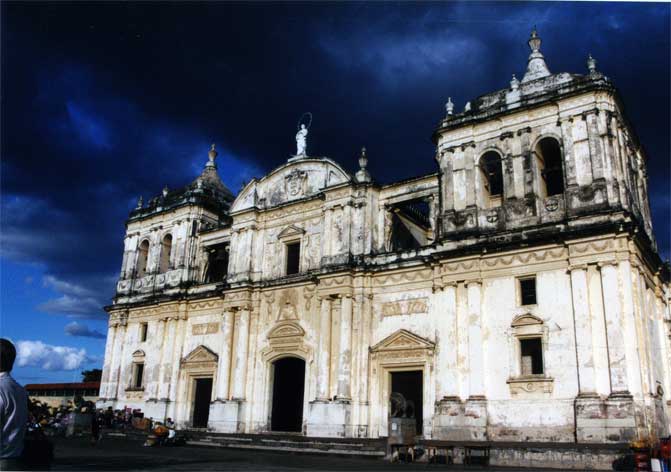
December 18, 2002
Grupo TACA decided that it would be a good idea for me to spend the night in the Miami airport, so here I am, sleeping on the group underneath a speaker that plays the J-Lo song, "Jenny from the block," approximately every fifteen minutes. There seems to be no where in the airport that is even remotely quiet and it seems that many people here have had the same problem that I have. My flight from Chicago to Miami was delayed by 90 minutes due to bad weather and as a result I did not arrive at the Grupo TACA gate in Miami until 75 minutes before my flight. I was told the flight was closed, despite my holding a boarding pass, and that I would have to return to ticketing. I raced back through the airport to the ticket area and found the TACA counter deserted. There were three other people in front of me, waiting in line for a desk that was empty. Eventually a woman arrived to take the complaints. The three people in front of me all spoke some Spanish and after rather violent conversations, they recieved some kind of hand written ticket. I spoke little Spanish and was told that the flight was closed, but that they would try to put me on a flight tomorrow afternoon. So, here I sleep in Miami, rather than in Managua, with J-Lo proclaiming that she used to have a little, but now she's got a lot. I'll miss my rendezvous with Mike and Andrew on Ometeppe Island tomorrow, which means that I'll also have to skip Granada, which is supposed to be a wonderful old town. Not an auspicious start to my winter vacation away from the doldrums of central Indiana.
There was a flight to Managua at 4:50 am which I paid $100 to try to fly standby. It was, predictably, packed and at the last minute I was denied a seat. Back to the ticketing area to wait for the next flight in the afternoon. For a change, I sat outside near the road to breathe the sweet smell of gasoline and diesel, which was preferable to J-Lo, which was still playing over the airport's speaker system. A bearded man about my age sat down next to me and pulled a king can of Fosters out of a brown paper sack. He had originally planned to go to Venezuela this winter and travel via jeep deep in the interior. After some civil unpleasantness, he decided to go to Colombia instead, where he had studied as a student for a year. Lovely place, he said, and much safer than expected. Everyone that I had talked to that had been to Colombia had loved it. I related my story to him, which he seemed to have heard before. I had to be firm and mean with the South American airlines, he said, or I'd never get anywhere. This might be the case, I thought, as I had been nothing but polite and nice and had gotten nowhere. We talked for an hour and then he left to catch his flight, and I returned to try to sleep for another hour or two before lining up once again.
I lined up at 10:30 am, with only two dozen or so passengers in front of me, all with massive bales of luggage that they were bringing back to Central America. I waited and waited and waited. In an hour, TACA managed to process dozen people. And so I waited some more. After two hours in line, I finally got to see an employee, who heard my tale of woe and, much to my surprise, guaranteed me a space on the afternoon flight to Managua. He even gave me a $400 travel voucher on a future TACA flight. While I had no intention of flying TACA again, I appreciated the gesture. He worked on the computer for a while and eventually found space for me on the flight, no doubt bumping off someone else off the flight to make room for me. With boarding pass in hand, I returned through security to the gate and snoozed for a while before the flight. Most flights, both domestic and international, that I have been on seem to start boarding thirty or forty five minutes before they are set to leave. TACA started boarding two hours in advance. When I did find my seat, I was able to sleep for another hour before the plane finally took off from Miami and headed south over the Caribbean toward Central America.
Last winter I spent many hours flying from Chicago to Ottawa to London to Qatar to Kathmandu. The flight to Managua was under two hours and I was glad I had decided to be a loafer this winter rather than a hiker in some far off place. The descent into Managua was a rather thrilling one, as the Managua has several large volcanoes around it and the pilot had to bank hard several times before getting properly lined up with the runway. When the plane touched the ground and slowed to a taxi, the occupants clapped and cheered. I wasn't sure if that was a custom, or if I should have been more worried about the flight.
The Managua airport was not crowded and there was no more J-Lo, for which I was thankful beyond words. Clearing customs took only a few minutes and from plane to the outside took less than twenty minutes. I was expecting to be mobbed by taxi drivers when I exited, as I had in Kathmandu, but instead when I left the airport I found myself mostly alone. A few people were leaning on cars in the heat of the afternoon, but no one came up to me, no one grabbed on to me, no one tried to pull me to their car. Eventually a young man came up to me and asked me in Spanish if I needed a taxi. He had various ID badges on him that made him some kind of official taxi arranger. Very relaxed, no stress. I nodded and tried, in my best Spanish, to find out how much the taxi was. It sounded like he said $60, which I thought rather ridiculous, so I countered with $20, again in my best Spanish. He looked puzzled and looked over at a driver and muttered something like, "est gordo, no?" I realized my error in translation: I had negotiated the price up from $15 to $20. We settled back on $15 and I was whisked away in a old taxi into the streets of Managua.
Managua was not what I was expecting. I was expecting a Central American version of Kathmandu, complete with much garbage, beggars, and filth. Instead, I found a mostly clean city, few beggars, and pretty statues of revolutionaries carrying AK-47s. We rambled through the easy traffic for fifteen minutes before entering a residential neighborhood. He dropped me in front of Casa de Huespedes Santos, which was the cheapest place listed in the Lonely Planet Guidebook that I was carrying: $3 a night. I should have been tired from my ordeal in Miami, but instead I found myself pleasantly high on the fact that I was in Nicaragua, home of the Sandinistas and Contras and Daniel Ortega, who had been made out to be something of a rascal when I was growing up.
The hotel was rather dumpy, but more or less clean and with a lot of character. I settled in and joined a group of young backpackers around a table. Several Australians were there and they had been traveling for more than a year. They had had some crime problems in Nicaragua so far, but they sounded mostly like crimes of opportunity, based on the foolishness of the Australians. We went around the corner to a house front where an old lady was selling food. I got a large scoop of gallo pinto (literally, spotted rooster, but in fact just rice and beans), some fried cheese, and an enchilada, which was more like a deep fried burrito than the saucy thing you get in the States. Topped with pickled cabbage and lost of homemade hotsauce and wrapped in a banana leaf, it was the best $2 dinner I'd ever had.
I spent the evening talking with the Australians and a very cute Dutch girl who had been working in Ecuador as a tour group leader for six months, but was now on holiday in Central America. We chatted until my strength gave out and I retired to my room to take a shower in the cool of the evening. The bathroom was rather interesting: A locker with a toilet and a pipe coming out from the ceiling about two feet away from it. No shower head, just the end of a pipe. I took a cold shower and looked over the stained bed. I decided that it might be best to sleep in my silk liner instead of the sheets. The bed was soft and lumpy but very comfortable after the hard ground of the Miami airport. I had missed my meeting with Mike and Andrew on Ometeppe, but I was sure they would understand. After all, we had arranged to meet with such a problem in mind, so as long as I reached Altagracia tomorrow, I I should be okay.
I awoke early and tried to read the local newspaper, which was difficult given my poor Spanish. Another cute Dutch girl came to join me and we talked for a bit about her work in Nicaragua. She was working on some sort of masters degree in health and was conducting research on why so few women in Nicaragua require their partners to use condoms. Seemed like dull work to me, but she seemed to enjoy her work, although she disliked Managua. I walked down to the bank and changed $140 into cordoba, the local currency. Dollars seem to work just fine here, but I prefer to have some local cash. I decided against breakfast and so I retrieved my pack from the Casa and hailed a taxi to the Mercado Huembes, which is where buses heading south depart from. Unlike the airport, when I stepped out of the taxi I was mobbed with people pulling and shouting. I didn't help matters by being indecisive. Eventually I found my way onto an old yellow school bus, which used to see service somewhere in the States, glad to be out of the roar of the market place. Within twenty minutes the bus had filled and started to roll out of the market place, despite the fact that various vendors were still on board, trying to sell bags of brightly colored soda pop and packs of gum to the riders. They hopped off, or were kicked off, in a few minutes as the bus cleared the market and started on the Pan American highway.
A toll collector came around, moving through the narrow aisle, taking people's fare. You said where you were going (Rivas) and he told you how much. Very simple, though unheard of in the States. The countryside rolled by green and lush, with the smell of burning vegetation hanging in the air. I liked Nicaragua already, despite the habit of people simply throwing their trash out of the bus window. The countryside was pretty and the people on board seemed to ignore my presence or, rather, they didn't see me as a walking dollar. I liked that. The bus ride to Rivas lasted two hours and I was glad to hop out and stretch my legs a little bit. Taxis were waiting at the bus terminal, though there was no hustle and bustle as back in Managua. I took a taxi out to San Jorge for 5 Cor. (about 50 cents), a pleasant lakeside town with a cathedral and a few shops. I walked out to the pier to find out when the next ferry was and was disappointed to find out that it didn't leave until 2:30. So, I retired to a little shack for some lunch: Gallo pinto, pickled cabbage, and grilled pork, washed down with two bottles of local beer. Again, the food was outstanding and ran me $2 for my feast.
After lunching and drinking my beer, I walked back to the pier to stare at Volcan Concepcion, one of the two volcanoes on Ometeppe Island. Without a cloud in the sky, it was hard to gain much perspective on the size of the volcano, but it seemed larger than the 1600 meters that I knew it to be.
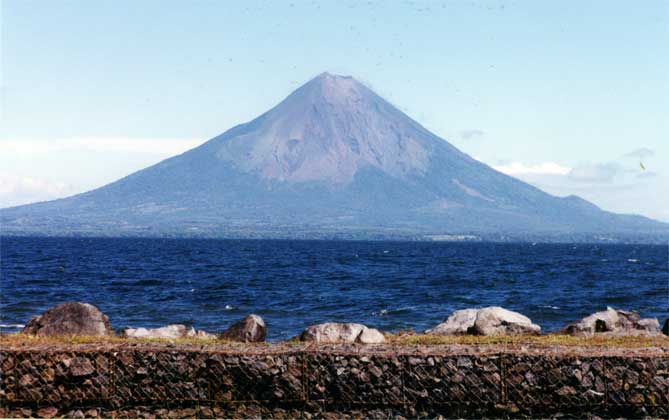
There seemed to be a lot of activity at the dock, so I went over and asked one of the workers when it left. It took me several tries, but eventually I understood that the boat was leaving at 12:30. My Spanish ear had deceived me once again. I piled on board along with several other tourists, including an American woman, and the boat set out. A young boy was walking around the boat with a styrofoam cooler filled with small bowls of ceviche, which his grandmother had made in the morning. Delightful stuff. Fresh fish, chili, lime. Nothing more. The ride across Lake Nicaragua to the island took forty minutes on the mostly calm waters and I disembarked at the port of Moyogalpa, which didn't seem to have much to recommend it, but wasn't bad either. People lounged about in the heat of the afternoon, doing not much at all, and I strolled through town to the bus stop unmolested by touts or hawkers. Yes, indeed, I liked Nicaragua so far. I boarded another old yellow school bus which slowly filled half way over the course of forty five minutes, and then we set out along the unpaved, bumpy, dusty road to Altagracia. Lush vegetation, beautiful little farms, and an occasional soccer field composed the countryside of the island. A few tourists got off the bus mid way through the ride to Altagracia, and I was the only whitey who got off forty minutes later in the charming little town.
It was only 2:30 and I wasn't supposed to meet Mike and Andrew for another four hours, but I thought it best to locate Hotel Centrale, our declared meeting point. After getting turned around a bit, I found the pleasant place, with a FSLN (Sandinista) mural opposite it, but no Mike or Andrew. I walked back down the street to a little shack and drank a cold beer in the lethargic heat.
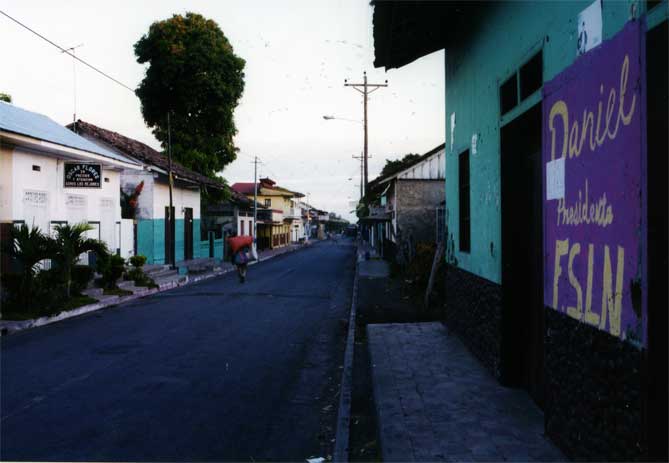
The power went out as I sat and swatted at flies, which changed nothing so far as I could tell, other than the fact that the crackling radio went out for a while. I had another beer, doing nothing, just as the locals were doing. Yes, indeed, I very much liked Nicaragua. In Kathmandu I would have had to fight off people looking to sell me things or take me tours or find a hotel for me. Here, I was left alone to drink my beer in the heat of the day and practice my Spanish on the man behind the counter occasionally. The power came back on and the radio started crackling again and I decided to relocate to the hotel to wait for my friends.
Midway through another beer, Mike and Andrew showed up after spending the day on the lakefront and a nice shady spot, completely devoid of tourist development or touts. I related my story in Miami to then and they seemed to understand completely, as I thought they would. We had a few more beers and made plans to climb Concepcion tomorrow. They had gotten a triple the night before in the hotel and we retired there before dinner. The triple was really a small cottage set in a walled in, well tended garden, complete with mango trees. As night fell and the air cooled, we ate dinner at the hotel, the power going out on several occasions. In the darkness, the thick smell of the vegetation on the island dominated and I felt a sense of profound enjoyment at being in Nicaragua. A country that had been branded as evil and villainous while I was growing up, a country at the heart of the Iran-Contra scandal, a country portrayed as the epitome of third world backwardness. It turned out to be a very pleasant place and I was glad to be here.
After sleeping deeply Mike and I went out to buy water and snacks for the climb up Concepcion before eating breakfast at the hotel (homemade tortillas, beans, queso fresco, friend plantains, eggs, toast, coffee) and trying, in my best Spanish, to arrange for a guide to show us the way up the volcano. The hotel owner found a young man named Alan that did such things, but today was not to be the day. Alan said it was too late in the morning and that the climb up was hot and had no shade. At least that is what I thought he said and we agreed to meet tomorrow morning at 5:30 for the climb. With nothing else to do, we decided to walk around part of the island back to Moyogalpa. Mike picked up a recently fallen mango for me to feast on on the way out of town. The best mango I had ever had. And it was just sitting in the dust by the side of the road. Yes, I liked Nicaragua.
We walked for a while, sat under trees for a while, walked, rested, walked. It was pleasant out in the countryside, although the day was slowly heating up. Locals waved to us from their farms as we went by, young girls giggling as they passed us on their bicycles. Everyone seemed happy here, everyone seemed well fed and content. It occured to me on our walk that I had not yet seen anything that I would call poverty. Most people seemed to have clothes to wear and food to eat and a little land to live on, either with a spouse or with parents and other relatives. Radios were fairly frequent.
We stopped in Moyogalpa for a lunch of jugo melon (melon juice) and jalapeno beef, which was the toughest thing I've ever had to chew. I eventually gave up on it after a few pieces. Judging by the look of the bony cows that we had seen on our three hour jaunt around the island, this perhaps was not very surprising. Better stick to chicken and pork. We caught a school bus back to Altagracia, but it was jammed full of people and broke down twice on the way. I was sitting over the wheelwell and my knees were under my chin for the better part of two hours. At least it broke down, the first time, in front of a soccer field where a match was taking place.
Back in Altagracia we sat around and had a few beers as day turned to night, before strolling about the darkened town to find dinner. I had a light dinner that resembled my breakfast quite a bit, but with the eggs replaced by chicken and the toast replaced by more beer. We retired early in anticipation of the climb of the volcano and I slept once again very peacefully in this much maligned (at least in the US) country.
The alarm on my watch got us up at 5 am to collect our gear and wait for Alan in the courtyard of the hotel in the darkness of the early morning. Andrew was still asleep, prefering to spend the day looking for old petroglyphs rather than scaling a 1600 meter volcano. A knock was heard at the main door and a teenage boy awoke from a sofa in the front area to answer it. Alan couldn't make it, but had arranged for a friend of his, Diego, to take us up the volcano for $15. Into the darkness we strolled, toward La Sabana. Diego's English was much better than my Spanish, so after a few attempts to communicate in Spanish I gave up and switched to English once again. As the sun began to come up we left the roadway for a smaller track that brought us through a tiny hamlet, apparently Diego's home town. I had never gone on a trip with a guide before and Diego was proving to be a pleasant new experience. He pointed out flowers and vegetables, and, as we began the climb proper, told us what was making the shrieking sounds we had been hearing: Congo mono, or howler monkey. There was a quite recognizable trail heading up into the jungle covering the lower flanks of the volcano and, although steep, I was able to keep up with Diego. Mike, however, seemed to struggle somewhat with the elevation gain, which both Diego and I thought rather funny.
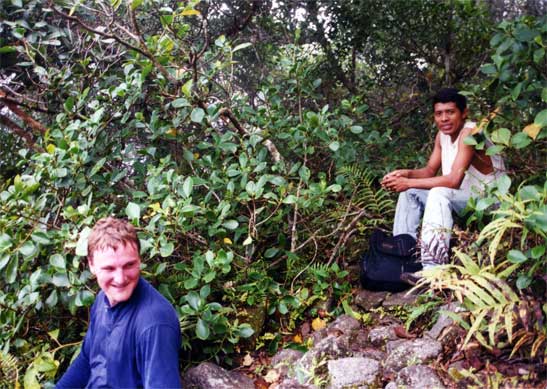
As we cleared 800 meters, a thick fog set in and everything quickly became damp in the mist. Diego pointed out an interesting plant that looked like a giant rhubarb, but with a circular stalk. They were growing everywhere and it seemed there name was Vergonias. Diego's English was giving out, so we switched to a mixture of languages, along with pantomimes. From what I could gather, a vergonia was also known as an Umbrella plant, as the poor frequently would hack off a stalk to use as a temporary umbrella in the rain. Given the size of the leaf, this seemed very sensible. On our way up we passed a Quebecois on his way down, having camped high on the slopes of the volcano the night before. We even found his tent site, as he had left a few stakes laying about. We ditched our packs for the last thirty vertical meters and climbed up to the rim of the volcano. Diego urged us to be careful and we crawled up to the rim on our bellies. After the cold of the mist, the heat coming off the volcano was pleasant, although the strong scent of sulphur was not the greatest reward for our efforts.
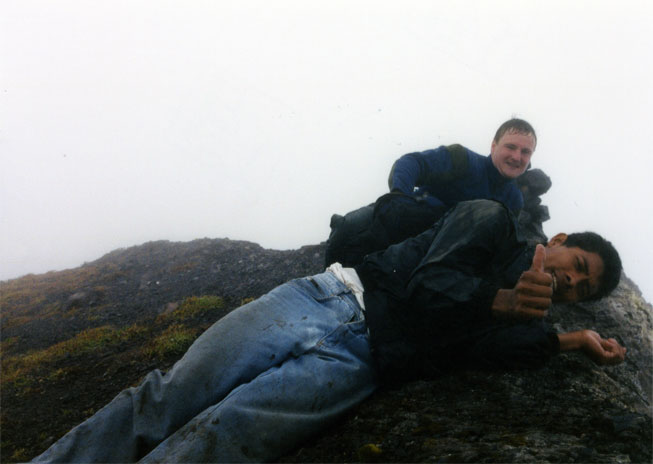
We sat up on the rim in the mist enjoying the heat for a while before getting hungry and heading down to the packs. The three of us split two packages of cookies that Mike and I had gotten the day before and then set off to return to Altagracia. While Mike had had diffculties on the way up, I had far more on the way down. My trail runners slipped and slided on the wet rocks and I fell down four or five times in the first twenty minutes, cutting my hand and bruising my ankles. Diego and Mike thought this amusing as well, but did their best to hide it from me. If it was someone other than myself falling, I would have thought it funny too. My legs were total jelly when we descended from the mist and got views off to the other side of Ometeppe, where Volcan Maderas was located. It was supposed to be a shorter, easier climb but I had little desire to run up it now.
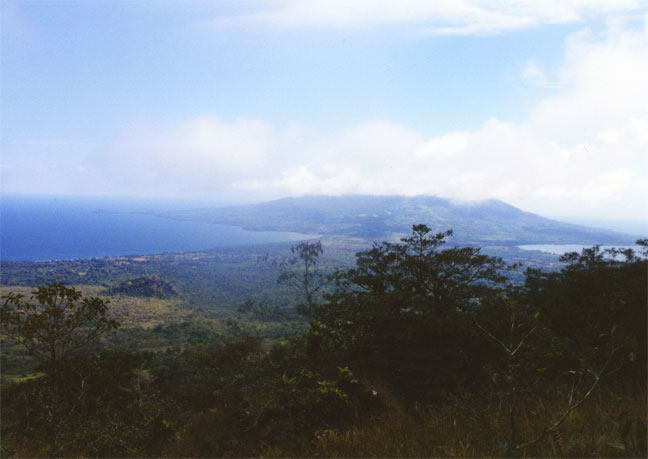
The increasing visibility gave us much opportunity to rest on the way down, something I was grateful for. I had lost almost complete control of my legs and each step became an effort not to fall down, despite the good footing. Several teenagers passed us heading up the volcano. Diego told us they were local orphans, but I suspect that our languages didn't quite match up. Pretty flowers could be seen here and there, and eventually we found a small tribe of howler monkeys, who were most distressed that we had decided to rest under their tree.
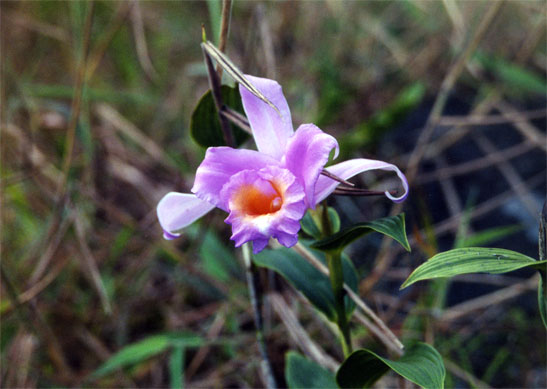
Even on the flat road my legs were so shot that I trouble keeping up with Diego and Mike, although they slowed down for me quite a bit. On the walk through the hamlet at the base, Diego seemed to know every little kid running about. He'd pat one on the head or shout something quick and sharp in Spanish, causing peals of laughter from the young ones. There seemed to be a real sense of community here, something that was lacking in most parts of the States. After what seemed to be an eternity, we finally reached Hotel Centrale and paid Diego $25. Both Mike and I had had a wonderful time (except for all of my falling) and, it seemed, Diego had as well. I was covered in mud and completely wet, but Mike, being the elder, got the shower first. So, I sat out in front of the cottage and ate a mango instead and inspected my various wounds.
In the evening I was clean and showered and had even done laundry, washing out my clothes in an empty garbage can with Camp Suds. We ate out again and once again I made the mistake of ordering beef, though this time it was just barely edible. Washed down, of course, with three bottles of Nicaraguan beer. The three of us decided to leave Ometeppe tomorrow and head out to Leon, north of Managua, where we would spent the few days around Christmas. Leon was the prime stronghold of the rebel movement against Somoza and should prove to be an interesting place to spend a few days. I was sad at the prospect of leaving Ometeppe, which seemed so delightful. I had not seen any tourists since the first bus ride from Moyogalpa, which surprised me somewhat. I'll have to come back here some time for a longer visit. I took a few ibuprofen tablets before going to bed, hoping that my sore legs would heal up overnight before starting the day long trip to Leon.
We got up early once again to catch the first bus to Moyogalpa and then the ferry to San Jorge. A man was waiting in the park for the same bus with a squirrel on a string leash, which seemed rather comical. Except nobody else seemed to notice him. The bus rolled out of Altagracia at 7:15, rolling down the bumpy, dusty road, but was mostly empty, which allowed me to stretch out my incredibly sore legs: They were sore enough to make stepping up to the bus difficult. In Moyogalpa I ran into two of the Australians from Managua. They had been robbed two more times since I had left them a couple of days ago. Once in Managua, and once in a close by sea side town called San Juan del Sur. I couldn't imagine robbery taking place in such a calm country, but apprently it did. They had come out to Moyogalpa yesterday on the ferry, but didn't go any farther and were planning to go back to the mainland. One strolled about topless, which generated the only dirty looks on the faces of the locals that I had seen. I bought some bananas for breakfast and joined Mike and Andrew on the pier, waiting for the boat.
We retraced the exact route I had taken from Managua a few days earlier, and from Mercado Huembes caught a blazingly fast taxi ride to a bus station on the north side of town, Mercado Boer. Rather than take another yellow school bus, we tried a minibus instead, hoping it might be faster and more comfortable, even if it was a little more expensive. The mini bus turned out to be slightly faster, but was no more comfortable. At least I had a window seat and so could watch the country side roll by on the Pan American highway.
The minibus dropped us on the outskirts of town, so we had to get a taxi to take us in for a few cordobas, which took us to the Hotel Americain, and old house with a cool courtyard and spacious rooms, all for only $18 a night for the three of us. After settling in we walked out to the nearby market place and plaza to see what Leon held. Of course, we had to stop in to a small cafe for a couple of beers, as the afternoon heat was starting to take its toll on us. Leon is low in elevation and even in December it was hot. A hypodermic needle sat in the flower pot next to our table, which didn't exactly add to the ambiance of the place. The plaza was headed by a large cathedral that we poked around in, trying to stay out of the way of the patrons of the church.
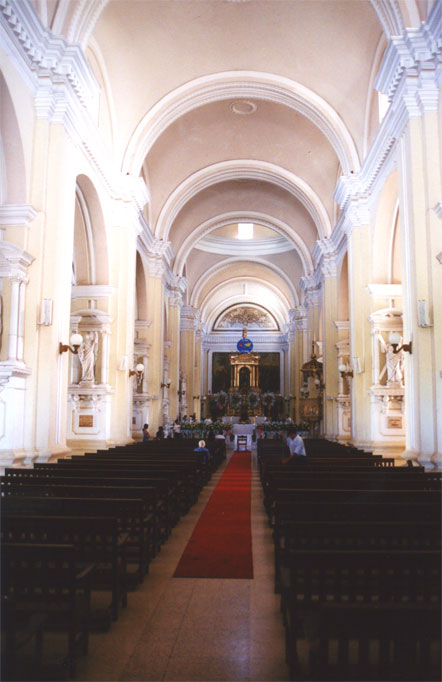
I was tiring of eating restaurant food and was able to convince Mike and Andrew to eat out of a street stall, of which there were many in the plaza. Usually the stall was run by an older woman with a propane grill and had a few plastic tables and chairs. I had an excellent potato and beef empanada along with the requisite gallo pinto and pickled cabbage with hot sauce. We retired to a local cafe on the side of the plaza for some more beers and pineapple refrescos (pineapple blended with milk and sugar). Sitting out in the open, on the street side, both Mike and Andrew commented about how rare this peace was. Normally, in their travels to the devloping world, sitting street side is an invitation to be harassed constantly by beggars, hawkers, and touts. The Nicaraguans left us in peace instead. We order some ceviche and more refrescos, but the ceviche was not up to the standard of the little boy's grandmother on the ferry ride to Moyogalpa. A general rule seemed to be emerging that governed food in Nicaragua: If you want the good stuff, eat in the street. Mike and Andrew didn't think much of my rule. Various Christmas processions came by, complete with costumed performers walking on stilts or with oversized heads. We threw some coins at them, following the lead of the locals, before walking back through the dark streets to Hotel Americain and a well deserved rest after a long day of traveling.
After two mornings in a row of waking up early, sleeping in to 8 am was a real luxury. We breakfasted in the courtyard on daysaiuno tipico, which translates to beans, fried plantains, eggs, toast, and coffee, before heading out to look around Leon. We poked around the cathedral a little more thoroughly this time as it was more or less empty, except for a pious few sitting in the pews praying quietly. The paintings and statues were all rather iconoclastic and somewhat brutal in their depictions, but on the whole the cathedral was a charming place to spend an hour looking about.

The plaza was slowly filling with the towns inhabitants and a few tourists strolling about. Old folks sat on the benches. Just sat. Nothing else.
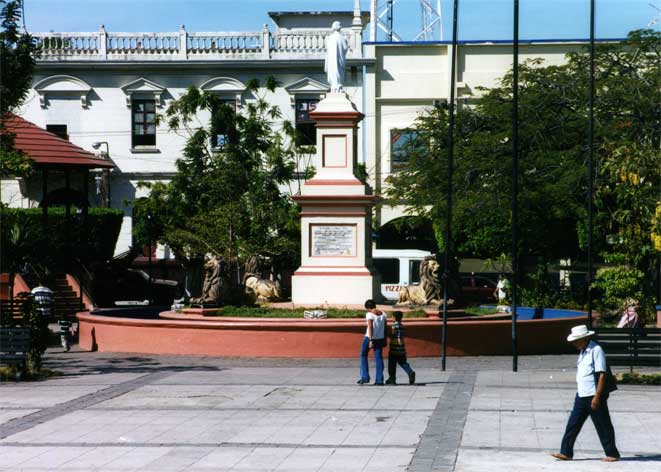
As we strolled about town, we began to notice more and more murals. And not simple, vulgar graffiti, but rather intricate works of art. Most were of the revolutionary nature and focused on figures that were important in Nicaragua's recent past, such as Sandino. Most usually featured some depiction of the United States as well.
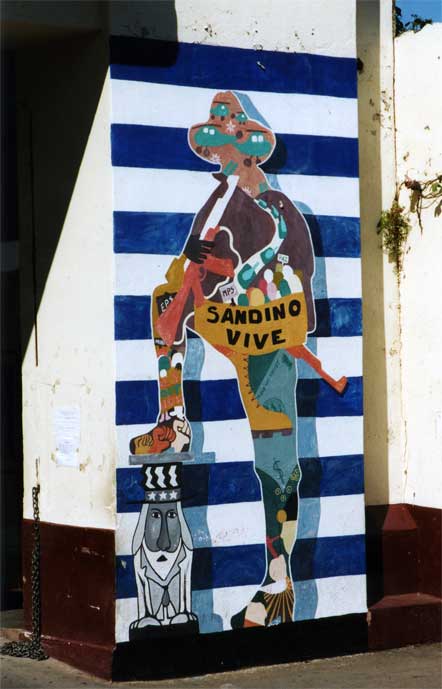
There was an entire subplaza dedicated, as a sign told us, to the heroes and martyrs of the struggle against the Somoza dynasty.
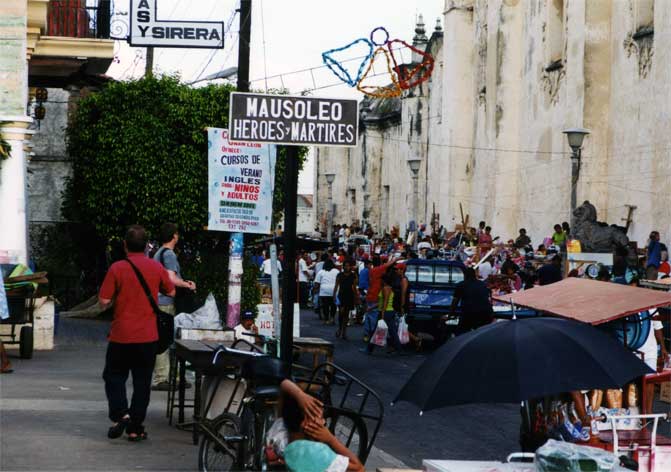
The walls of the subplaza had numerous paintings, some showing people, others symbols to help the Nicaraguans remember the cost of removing several generations of homegrown dictators from the helm of their country.
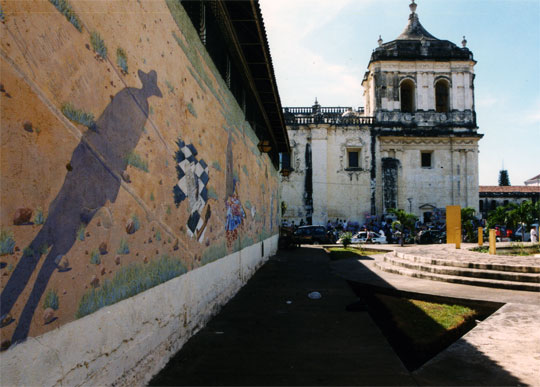
It was odd, as an American, to stand in such a place. Growing up, Nicaragua was evil, or at least the Sandinistas were evil. The Contras were the good guys. Whether or not these two things were actually true didn't strike me as important at the moment. What was important was that the Nicaraguans had managed to toss out, at considerable cost, the brutal Somoza family and whatever came after them had to be an improvement.
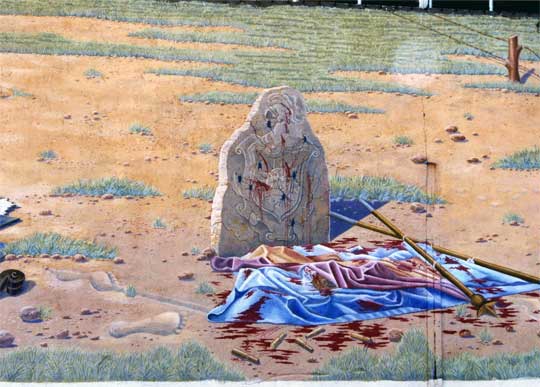
We left the subplaza and strolled about until we found a small cafe that was selling orange juice, of which we each had several tall glasses. The girl behind the counter had huge sacks full of oranges and would squeeze five or six, manually, for each glass. In the growing heat of the day, it was the perfect refresher. We set off in search of more murals and found some dynamite ones down the street from the cafe. A particularly nice one was dedicated to Edgard Munguia, a local revolutionary who was beaten and tortured (dragged through the streets by a jeep!) by Somoza's Civil Guard (Gestapo), but survived to fight another day.
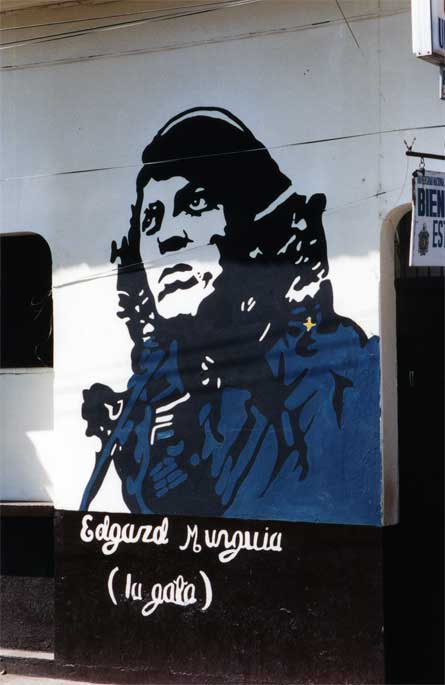
A mural close by showed the horrors of war, particularly a civil war, where brother fights brother and a country is torn apart. In the end, at least in Nicaragua's case, it seemed to be worth it, even if the price was high.
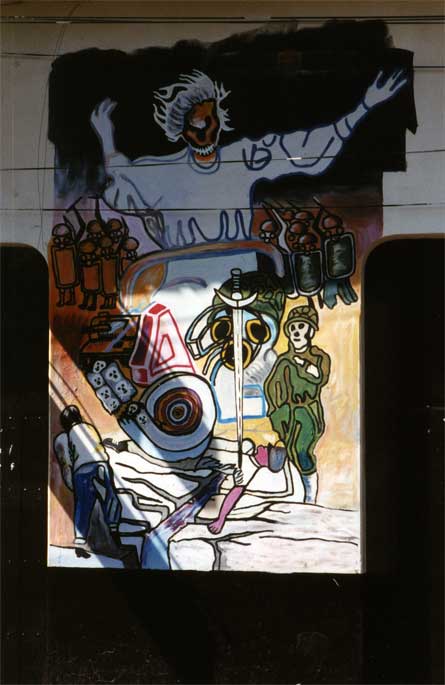
Although I know a few things about Latin American history, there were faces that I just couldn't place. But, I snapped photos anyways because the murals were showing something of the soul of the country and the spirit of the people, in addition to simply being well done.
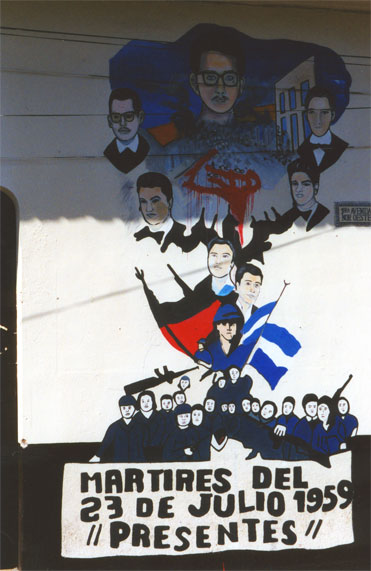
At a local basketball court, we found long walls filled with political murals, quite a change from the sort of paintings that seem to dot every urban basketball court in the States.
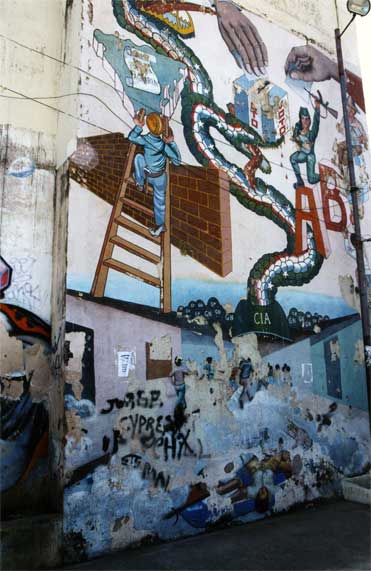
On a separate wall of the court there was a massive mural and I spent a good half hour looking over all the little pieces of it.
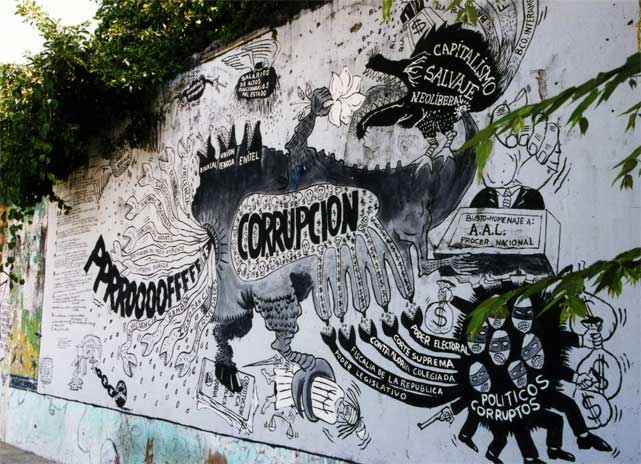
Paintings of Che Guevara were, of course, all over Leon, but I found one set in the court yard that had his dour vissage (middle), along with Sandino (left) and Carlos Fonseca (right), one of the original founders of the Sandinista movement. He would not live to see the triumph of his movement over the Somoza regime.
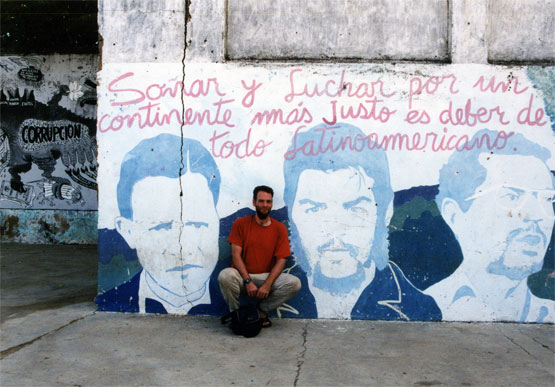
One of the most intersting murals was located just a few meters from the basketball court. It depicted a woman doing a little mathematics.
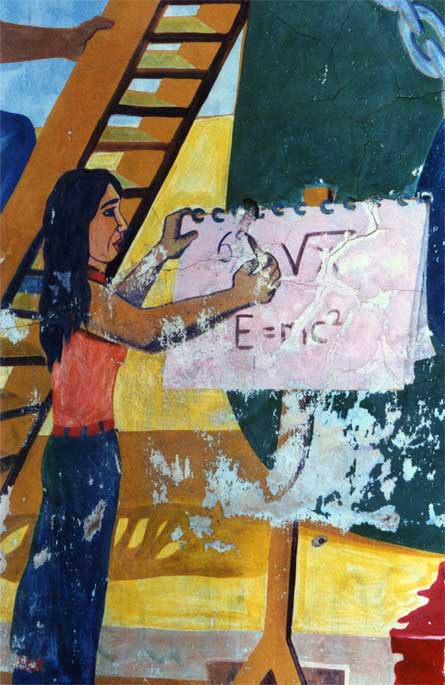
After tiring of hunting murals, we looked around for the local post office so that Andrew could mail home some post cards. Along the way, we passed the local university (it might be fun to work here for a year or so) and several quaint churches. The number of churches in the Sandinista stronghold seemed somewhat out of place, given the general movement against the church in many Latin American revolutionary circles. But I liked them nonetheless.
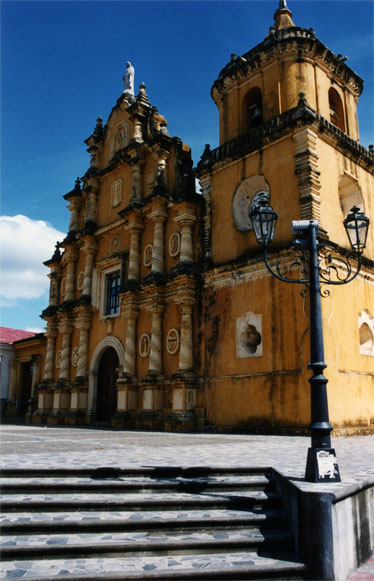
The heat of the day had caught up to us with a fury and we retreated to the orange juice cafe for some afternoon refreshment. After a glass of the fresh squeeze stuff, something in the corner of my eye demanded attention. Looking over, I quickly poked Mike and grabbed for my camera: Santa Claus was coming down the street in his sleigh.
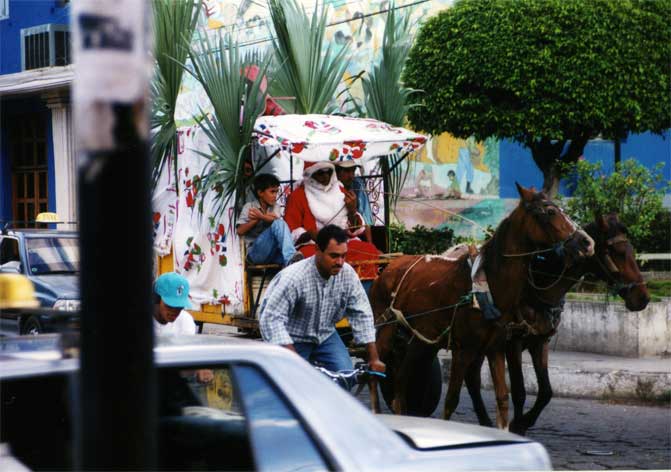
This bit of comedy over, we drank down some more orange juice and retired to the hotel for an hour siesta until the heat started to break. I wanted to take a look at the Sandinista museum in town and convinced Mike and Andrew to come along. Located off the main plaza, it was run by a 50ish man in faded green fatigues and consisted of two rooms of photographs and posters. Some of the photos were of the standard heroes of the local revolution, and of the more widespread leftist movement in Latin America. Included were pictures of the Somoza family and some gruesome photos of some of their victims. The museum keeper did his best to explain some of the photos, but his Spanish was beyond me. He was apparently an ex-revolutionary and never before had I so badly wanted to communicate with someone. My Spanish was good enough to get around with, but I couldn't ask him any of the important questions. I left the museum feeling that I had lost a great opportunity to learn something new.
We eventually had dinner in a popular local pizza place, surpisingly called White House Pizza, that made a fairly respectable pie. I would have prefered street food, but the pizza was nice anyways, especially washed down with several bottles of beer. A great day in Leon all around. Tomorrow is Christmas and it should be interesting to see how it is celebrated in Central America.
My second Christmas in a row spent outside the United States. Last Christmas I made the trek down from Gorak Shep in Nepal, near the base of Everest, to Dingboche where I met a Japanese climbing group that had just failed to make the first winter ascent of Lhotse, the world's fourth highest peak. They were so happy that no one had been hurt that they threw a (for Nepal) wild party in the small town.
After another daysaiuno tipico, we headed out of town through the Santiago de Guadelupe cemetary before picking up a dirt road that we thought headed to an old fort overlooking Leon. This led us to a very different kind of Leon than we had experienced the day before.
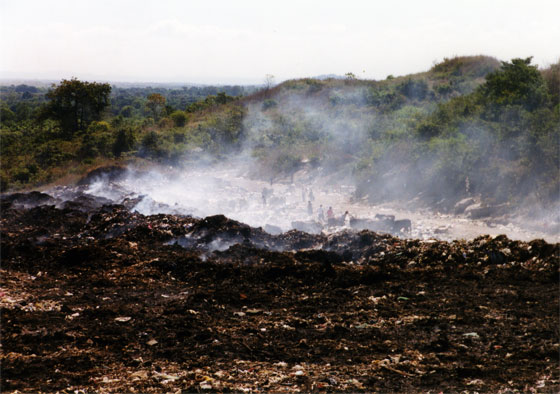
After getting directions from a man still reeling from the Chistmas eve celebrations the night before, we found our way climbing a low hill toward the fort, right past the towns trash dump. Smoldering fires were interspersed with the garbage, along with two dozen ragged men, women, and children picking through the garbage. This first display of true poverty in Nicaragua came as something as a jolt, especially as it came on Christmas day. The trash pickers seemed extremely surprised to see us, although they soon recovered their composure and made us the butt of many jokes. While not understanding the words, the tone and the laughter gave them away. I was glad to climb beyond the trash heap and up the fort. None of us said anything.
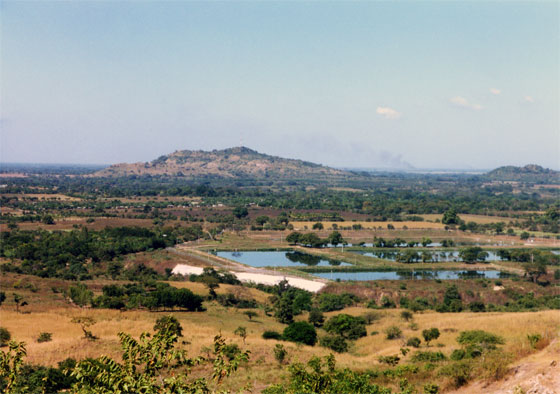
The view from the fort was nice and we spent some time exploring around before a few children from down below came up to see what we were up to, prompting us to leave. Mike and Andrew, both experienced travelers in the developing world, thought it best for us not to return via the dump, and instead we took a different road back into town.
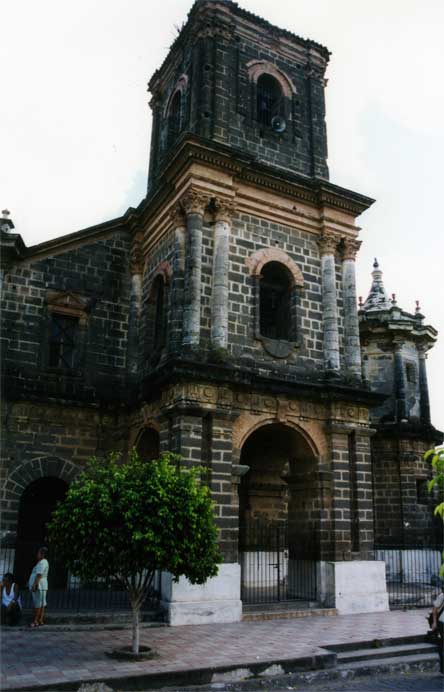
We reached the outskirts of town under a hot sun and stopped into a place for a few morning beers before braving the heat once again. We were well away from the city center and it was nice to see how people lived in the town. We passed several small store fronts that housed, assuming my translation is correct, some sort of debating clubs, along with the usual charming churches. We eventually found our way to the cafe on the corner of the main plaza and had several liquados (banana mixed with milk and sugar) to stave off the heat, which was getting rather oppressive for me, before returning to the hotel for a longer siesta. On the way, I bought a some lunch from an old lady operating a stall by the cathedral: For 10 cordobas (about a dollar), I got a nice portion of grilled pork along with gallo pinto and pickled cabbage. It was the best pork I had had anywhere. Period. Although Andrew and Mike didn't think much of my rule for dining in Nicaragua, it was confirmed in my mind with the incredible pork.
I spent the long siesta napping for a while before moving out to the courtyard to read for a little while. No one did anything during the hot afternoon and the entire town seemed to be asleep. No noise from the street, no cars, no children. Nothing. Just the heat and silence and Lord Jim. Around 5 the heat had broken and we straggled out to get something to eat. After the pork of the afternoon I was able to convince Mike and Andrew to eat some street food again for dinner, which they agreed to. Sitting in the plaza under the cathedral, I ate down some pork spare ribs and gallo pinto and pickled cabbage, and then went back for some fried cheese and some curious dumplings stuffed with straw-like greens. Washed down, with Fanta rather than beer, for a change. Mike proclaimed his polla asado to be one of the best chicken dishes he had ever had. For our evening entertainment we moved back to the cafe to watch the people go by and indulge in more banana liquados. This was really the height of laziness, I thought. I wasn't even working my mind. Just sipping on my drink and watching what happened in the plaza. Occasionally the three of us would converse about some topic, but mostly we just sat and watched and took in the cool night air. We were going to leave Nicaragua tomorrow for Honduras and I was, once again, rather sad to do so. Despite the trash heap earlier in the day, I thought Leon, except for the heat, to be a highly pleasant city, one where I could spend a month or so and not get bored.
We woke up early for what all of us knew was going to be a long day of traveling: Taxi to the Leon bus station, school bus to San Isidro, school bus to Esteli, taxi to the other side of Esteli to a different bus stop, school bus to Ocotal, flag down a luxury bus (we had to stand) to Los Manos, walk across the border, minibus to El Paraiso, minibus to Danli. At least the weather was pleasant as we crawled up and into the hills toward the Honduran border. Every bus was jammed full, sometimes with two others in the seat with me, when I was lucky enough to get one. Several of the buses were standing room only and I was rather amazed that the fare collectors were able to get through the aisles to the back. Several incidents of vomiting, including some that went out a window and flew back in, splashing Andrew a bit. No, not a particularly pleasant bit of traveling.
The border crossing into Honduras was easy and took only thirty minutes. All the gringoes on the bus teamed up in one large pack to make the run a little smoother. That meant the three of us and three others. We were all charged different amounts at the border, despite the entry fees being clearly posted on the wall behind the border agent. I didn't mind, as the mordita came out to be only an additional two dollars. We ended our travel in the border town of Danli which, unlike most border towns, was actually rather nice. We found a very nice hotel (Esperanza) for $30 for the three of us, complete with satellite television and soft beds and settled in to rest a little before dinner. I was starving, having eaten only a few pieces of fruit during the entire day. We found a fried chicken shack and wolfed down some crispy pollo along with several beers. As happened frequently, the power went out, but I had no problem finding my bottle of beer in the dark. This was definitely one of the most tiring days and I much prefered our loafing in Leon to the myriad of buses that we had taken today. Tomorrow should prove much easier as we are only going into Tegucigalpa, the Honduran capital, and should be able to get seats on a luxury express bus first thing in the morning. We made our way back to the hotel in complete darkness to watch soccer highlights on television. The peace of Nicaragua seemed rather far away to me.


























